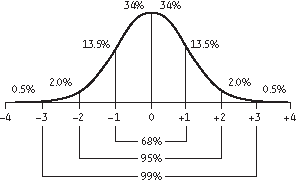
Group Intelligence Tests
Individual intelligence tests can be given only by specially trained psychologists. Such tests are expensive and time-consuming to administer, and so educational institutions often use tests that can be given to a group of people at the same time. Commonly used group intelligence tests include the Otis-Lennon School Ability Test and the Lorge-Thorndike Intelligence Test.
Biological Tests of Intelligence
Some researchers have suggested that biological indices such as reaction time and perceptual speed relate to intelligence as measured by IQ tests:
- Reaction time: the amount of time a subject takes to respond to a stimulus, such as by pushing a button when a light is presented.
- Perceptual speed: the amount of time a person takes to accurately perceive and discriminate between stimuli. For example, a test of perceptual speed might require a person to determine which of two lines is shorter when pairs of lines flash very briefly on a screen.
The Influence of Culture
Many psychologists believe that cultural bias can affect intelligence tests, for the following reasons:
- Tests that are constructed primarily by white, middle-class researchers may not be equally relevant to people of all ethnic groups and economic classes.
- Cultural values and experiences can affect factors such as attitude toward exams, degree of comfort in the test setting, motivation, competitiveness, rapport with the test administrator, and comfort with problem solving independently rather than as part of a team effort.
- Cultural stereotypes can affect the motivation to perform well on tests.
Characteristics of IQ Tests
Some characteristics of IQ tests are standardization, norms, percentile scores, standardization samples, reliability, and validity.
Standardization
Intelligence tests are standardized, which means that uniform procedures are used when administering and scoring the tests. Standardization helps to ensure that people taking a particular test all do so under the same conditions. Standardization also allows test takers to be compared, since it increases the likelihood that any difference in scores between test-takers is due to ability rather than the testing environment. The SAT and ACT are two examples of standardized tests.
Norms and Percentile Scores
Researchers use norms when scoring the tests. Norms provide information about how a person’s test score compares with the scores of other test takers. Norms allow raw test scores to be converted into percentile scores. A percentile score indicates the percentage of people who achieved the same as or less than a particular score. For example, if someone answered twenty items correctly on a thirty-item vocabulary test, he receives a raw score of 20. He consults the test norms and finds that a raw score of 20 corresponds with a percentile score of 90. This means that he scored the same as or higher than 90 percent of people who took the same test.
Standardization Samples
Psychologists come up with norms by giving a test to a standardization sample. A standardization sample is a large group of people that is representative of the entire population of potential test takers.
Reliability
Most intelligence tests have good reliability. Reliability is a test’s ability to yield the same results when the test is administered at different times to the same group of people. For more on reliability, see page 14.
Validity
Validity is a test’s ability to measure what it is supposed to measure. For more on validity, see page 14. Although intelligence tests cannot be considered good measures of general intelligence or general mental ability, they are reasonably valid indicators of the type of intelligence that enables good academic performance.
Critical Views on Intelligence Testing
Critics of widespread intelligence testing point out that politicians and the public in general misuse and misunderstand intelligence tests. They argue that these tests provide no information about how people go about solving problems. Also, say the critics, these tests do not explain why people with low intelligence scores can function intelligently in real-life situations. Advocates of intelligence testing point out that such tests can identify children who need special help, as well as gifted children who can benefit from opportunities for success.


 payment page
payment page



